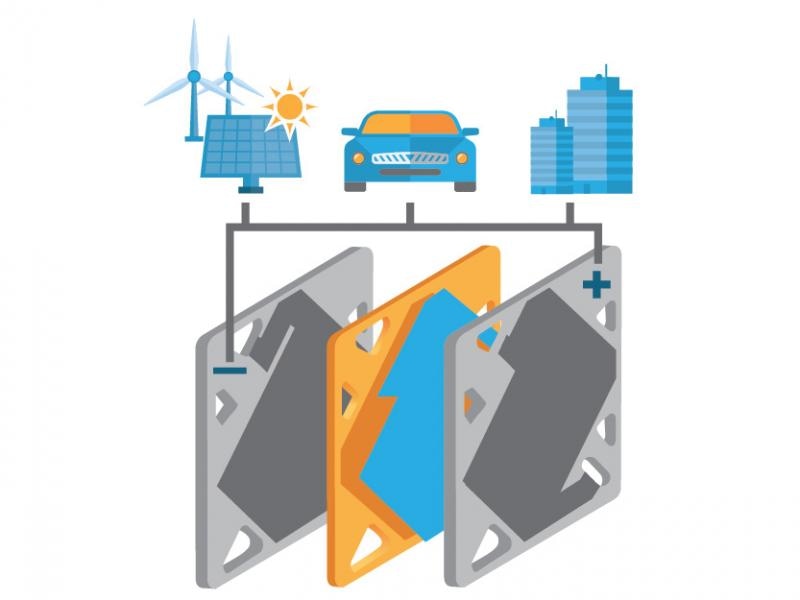Sep 19 2016
Rensselaer Polytechnic Institute has been awarded $2.2 million in funding from the U.S. Department of Energy’s Advanced Research Projects Agency-Energy (ARPA-E) to develop innovative ion conduction materials for next-generation renewable energy conversion and storage technology.
 Researchers at Rensselaer are working on durable alkaline membrane materialsto serve in next-generation fuel cells. Credit: Rensselaer Polytechnic Institute
Researchers at Rensselaer are working on durable alkaline membrane materialsto serve in next-generation fuel cells. Credit: Rensselaer Polytechnic Institute
The award is part of a $37 million package of funding from ARPA-E in support of 16 innovative new projects as part of the new Integration and Optimization of Novel Ion-Conducting Solids (IONICS) program. IONICS project teams are paving the way for technologies that overcome the limitations of current battery and fuel cell products. The IONICS program is focused on creating high-performance parts built with solid ion conductors – solids in which ions can be mobile and store energy – and processing and integrating these parts into devices to accelerate commercial development. In particular, IONICS projects will work to improve energy storage and conversion technologies in three categories: transportation batteries, grid-level storage, and fuel cells.
At Rensselaer, Chulsung Bae, associate professor of chemistry and chemical biology and a member of the New York State Center for Polymer Synthesis and the New York State Center for Future Energy Systems, will lead an effort to develop highly ion conductive, chemically stable, and mechanically durable alkaline membrane materials. Such membranes will serve as a critical component in next-generation fuel cells designed to allow efficient and clean conversion of chemical energy directly to electricity.
Curt Breneman, dean of the School of Science at Rensselaer, said that the work builds on the history of involvement in fuel cells at the New York State Center for Polymer Synthesis and the New York State Center for Future Energy Systems. In fact, most current fuel cell designs are based on an alternate acidic membrane approach that incorporates technologies refined at Rensselaer. The hydroxide approach, using alkaline conditions, is now seen as more promising and, with this award, Rensselaer will have a major role in the development of these technologies as well.
“This is part of a nationwide push to develop better fuel cell technology, and our strong background in fuel cell research and our forward momentum in new energy technologies is being recognized with this award,” Breneman said. “Rensselaer has a research focus in energy, environment, and smart systems, and this work is a clear outgrowth of that focus. Chulsung Bae is a rising star in this area, and we are proud of the work he is doing.”
Bae will lead an effort with a team of researchers from Rensselaer and partners at Georgia Tech, Xergy, and Proton Onsite.
“To be successful, a fuel cell membrane needs to be highly conductive – facilitating the flow of charge carriers – as well as chemically stable and mechanically durable,” said Bae. “Our work shows that high-performance alkaline conductors can improve efficiency and lower the cost of energy conversion technology. It’s cheaper, better, and more durable.”
The water repelling backbone of the membrane allows hydroxide ions to pass through extremely small channels while preventing it from swelling and sustaining structural damage. By using a polymer chain requiring fewer fluorine-based components, the team expects to reduce production costs. Side chains attached to the backbone facilitate the passage of hydroxide through the electrolyte.
The use of alkaline membranes in electrochemical reactions avoids the need for expensive platinum catalysts and allows the use of less expensive, Earth abundant metals as catalysts, offering huge economic advantages in renewable energy technology.
At Rensselaer, this research is enabled by the vision of The New Polytechnic, an emerging paradigm for higher education which recognizes that global challenges and opportunities are so great they cannot be adequately addressed by even the most talented person working alone. Rensselaer serves as a crossroads for collaboration — working with partners across disciplines, sectors, and geographic regions — to address complex global challenges, using the most advanced tools and technologies, many of which are developed at Rensselaer. Research at Rensselaer addresses some of the world’s most pressing technological challenges — from energy security and sustainable development to biotechnology and human health. The New Polytechnic is transformative in the global impact of research, in its innovative pedagogy, and in the lives of students at Rensselaer.